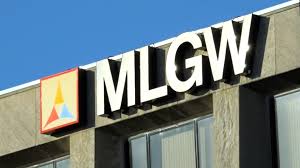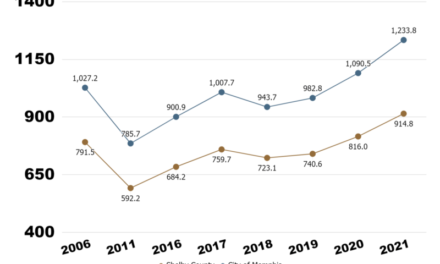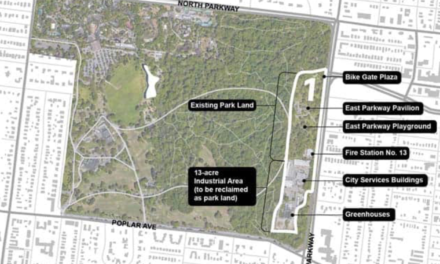First, Memphis Light, Gas & Water proposed that it move its headquarters outside Memphis to an unincorporated area of Shelby County.
Now, it wants to add two non-Memphis members to its board from the suburban towns, a curious priority since MLGW is an actual division of the City of Memphis.
Fortunately, the move appears dead although it’s never smart to rule out that there are people with vested interests who haven’t given up on the idea and are working behind the scenes to get it done.
The idea of adding two suburban members deserves a similar fate. It’s one of those proverbial political solutions looking for a problem. That said, it too hints at some political machinations by MLGW leadership to get it done for their own political reasons, for whatever that might be.
A Toothless Threat
This big idea tracks at least back to when hyper right wing, former Shelby County Commissioner Terry Roland pushed for it about eight years ago.
In opposition, Memphis Mayor Jim Strickland retorted with the perfect answer: the name of the utility is MEMPHIS Light, Gas & Water. In his view, it would be the tail wagging the dog. More to the point, there was a lack of any real reasons to add two members from the towns since they hadn’t paid for any investments, improvements, projects, and programs of MLGW.
Mr. Roland’s rationale was that customers outside Memphis get electricity and gas from the utility so therefore they deserve to be represented on the board. Last year, the Bartlett aldermen did some saber-rattling, suggesting that they might form a utility district.
It was a threat with little teeth to it. They apparently were flattered during the debate about determining if there was a better – and less expensive – option for electricity. TVA met with them to lobby for their help to oppose the exploration into whether someone other than TVA would better provide our electricity. It’s likely that MLGW was doing the same.
The Spin Begins
One MLGW board member has even said it’s “taxation without representation.” Actually, that’s absurd. It’s not a tax or anything close to a tax. MLGW is a service and we pay a monthly price for it just like we do for phone and internet services.
It’s a glib suburban and MLGW talking point but the seminal questions that have yet to be answered: How does adding these two non-Memphians actually improve MLGW and what substantively are these suburban towns bringing to the table – just talk or actual financial support?
More than anything, adding two members who are not singularly focused first on the needs of the owner city and who will be pressured to adhere to whatever agenda the town mayors will advance seems largely to take the eye off the ball.
It’s not as if the towns have no voice. There are presently two non-voting, knowledgeable MLGW members so it’s not like the towns are denied input and opportunities to make recommendations.
Before two new suburban voting members are added, we should understand precisely what their priorities and ambitions are and tell us the actual agenda they will be pursuing. More transparency is never out of order.
Already, we have a recent example of how city-suburban collaboration generally works. That’s when an anti-blight law supported by city, county, and others was defeated in a Tennessee Legislature subcommittee chaired by a Collierville legislator. It was an instructive lesson for how when push comes to shove, the towns rarely see a reason to pursue a reciprocal relationship with Memphis.
Because racial diversity matters in decisions affecting Memphis, it’s worth mentioning that today, the MLGW board has three African American members and two White members. Both of the current suburban non-voting members are White and they are the favorites to become the two new voting members, which means the board will become four White members and three African American members.
And it’s hard to imagine that the MLGW leadership isn’t pushing this without considering how it can put together a faction to support its agenda.
Susceptible to Flattery
The first indication that something was up was seen in how hard the present board members are pushing so hard to get this done. One even told an undecided Memphis City Council member that she must vote for this change or the towns will create their own electricity network.
That threat should be met with a shrug and the comment, Have at it?
It’s a laughable threat. The towns have enough trouble funding their own school districts and it’s next to impossible that the towns’ citizens, who are always tax sensitive, will be excited to pay higher taxes to have their own system.
Regardless of TVA’s wooing of the town mayors to oppose the City of Memphis RFP for electricity (and it’s inarguable that there is a supplier on our state lines that charge cheaper rates than the massive federal bureaucracy). And regardless of what the towns may think, TVA cannot discount its rates because every TVA customer pays the same rate for power.
And if the towns formed their own network, it’s left unsaid how they will pay the tens of millions of millions of dollars needed to pay for building new power grids for the suburbs.
A Flawed Argument
Some MLGW leaders and board members point out that Shelby County Mayor Lee Harris has a member on the Airport Authority and this is essentially the same thing.
Except it isn’t.
In that case, county government negotiated two members on the Airport Authority when special city and county government funding was needed in 1995 to pay for an international terminal for the much-coveted direct KLM flight from Memphis to Amsterdam. The flight long ago ended but Shelby County’s two members remain.
If the towns’ leadership wants to have a board member, it should tell us how it will join with Memphians to financially support the utility when it proposes special programs and projects. Then it would have a stronger case for board membership. Until then, it’s difficult to make a case for adding them.
In addition, it would require a Memphis referendum for two suburban members to be added to the MLGW board because it requires a change to the city’s charter which established the board with five members appointed by the Memphis mayor and confirmed by City Council.
Betting odds run strong against Memphis voters supporting the change to the charter to move the board’s total to seven. It’s even harder to imagine at this point what marketing message could lead Memphians to see any value in the change.
By and large, the MLGW board is widely considered a rubber stamp for the utility’s leadership, so if MLGW is to ask City Council to approve a referendum on this issue, it seems imperative that President Doug McGowen explain to Memphians why this is in their best interest.
City Hall South
Put simply, there are more questions than answers when it comes to this full court press for two new members to the MLGW board. One of the most important is who’ll write the language of the referendum because it could be key to the vote outcome.
Some wags refer to MLGW headquarters as “City Hall South” with some former members of the Strickland Administration now working there. It includes former City Attorney Jennifer Sink now serving as general counsel. If there’s a suggestion by MLGW that the referendum language could be written there, it should be dismissed out of hand.
Whenever MLGW brings the matter of adding two non-Memphis member to City Council, its members’ first requirement is for MLGW to issue a new RFP for electricity. A new RFP was recommended by Mayor Strickland’s own energy consultant who concluded that MLGW had not been an honest broker in the evaluations and analyses.
For years, MLGW had its thumb on the scales whenever there was a discussion about finding out what other electricity providers would charge. Numerous studies have shown that we pay a premium for TVA electricity.
All in all, MLGW has acted as a lobbyist for TVA and manipulated the processes, as shown when the new leadership at the Memphis utility said that issuing a new RFP wasn’t on its five-year list of priorities.
Before two new members for the MLGW board should even be considered, MLGW should be required to issue a new RFP being issued that is not skewed to get the answer MLGW wants.
Only then should City Council consider MLGW’s request for a referendum to add two suburban voting members to its board. In the absence of that, the request should be tossed into the trash bin.
**
Join us at the Smart City Memphis Facebook page and on Instagram where these blog posts are published along with occasional articles, reports, and commentaries that are relevant to Memphis.





